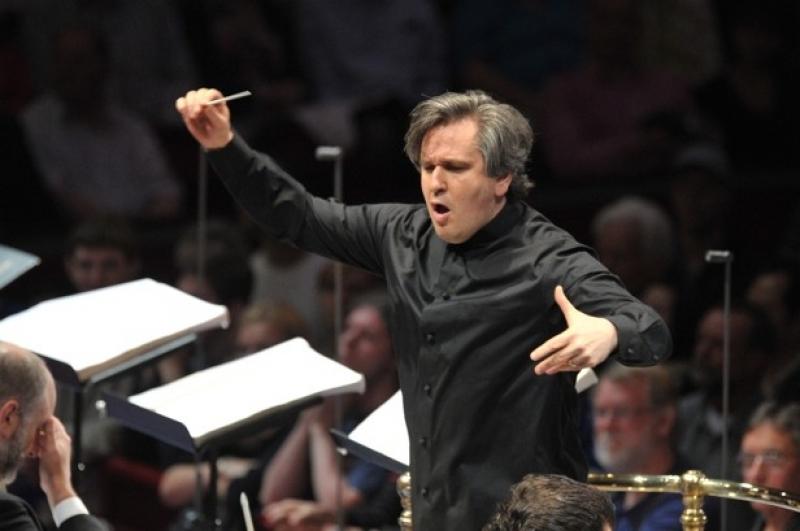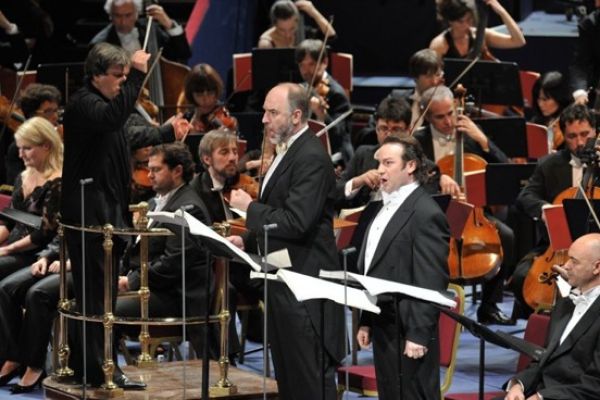BBC Proms: William Tell, Orchestra of the Academy of Santa Cecilia, Pappano | reviews, news & interviews
BBC Proms: William Tell, Orchestra of the Academy of Santa Cecilia, Pappano
BBC Proms: William Tell, Orchestra of the Academy of Santa Cecilia, Pappano
There's more to the piece than just the Lone Ranger overture
Sunday, 17 July 2011

Antonio Pappano brings out the best in RossiniBBC/Chris Christodoulou
Rossini's William Tell has to be the most well-known unknown opera ever written. There's unlikely to be a man, woman or dog on the planet who can't whistle or bark a part of the overture. But the other four hours? What of that? One opera aficionado told me that the last time he'd heard the whole thing live, Winston Churchill was still in Number 10. Prommers were being given their first chance last night. It was hard not to come to it with trepidation.
Because operas are like people; they aren't usually left on the shelf for this long for no reason.
Of course, there is a reason. A simple story of forbidden love and a downtrodden people (think Aida with cowbells) is drawn out in a way that almost defies belief. Four acts, 33 scenes, and more Swiss history than you ever needed (or wanted) to know makes it very likely that William Tell will forever be barred from the core repertoire. But much of the music, particularly in the first act - particularly when it's performed with as much flair as the Orchestra of the Academy of Santa Cecilia, Rome offered last night under the inexhaustible watch of Antonio Pappano - is undeniably ravishing.
Here was a Rossini few of us will have yet encountered in his operas, one whose emotional range, sense of orchestral experimentation and harmonic exploration seem to find their full maturity. Melodic invention bursts from the seams as usual. But so does rhythmic interest and structural niftiness. The recitative is woven together as if with a thread made of lightning, wriggling orchestral palpitations shooting through the stichomythia. Elsewhere, the meeting of the tender and the pastoral is quite unique. The sun-flushed first act benediction on the marriage celebrations lands on us like the sweetest of dawn kisses.

The orchestra were on cracking form, and knew it. There was an Italian sprezzatura to the sectional confidence; cellos, violins, woodwind, brass, all dealing with their individual hurdles as if they were showing off on the beach. There was a similar confidence (if not as much consistent success) in the singing. John Osborn (pictured right, on the right. Photo: BBC/Chris Christodoulou) rightly brought the house down for hitting his 28 high Cs and two high C-sharps in the final act cabaletta. And his piercing voice, which seemed to part the oceanic space before him very effectively, delivered much by way of a dashing heroism in the first act. But his moments of introspection hit the target far less.
His partner in the second act love duet was Malin Byström's Mathilde, whose buttery voice had a tendency to melt away just as you were beginning to believe in it. The lovebirds had plenty of energy but not enough charm or elegance or rapport at this key moment, which left the second act slightly deflated. Michele Pertusi's William Tell (pictured right, on the left. Photo: BBC/Chris Christodoulou) was nicely moody. Elena Xanthoudakis's small but brightly voiced turn as Tell's nearly sacrificed son, Jemmy, was a ray of very welcome vocal sun. And the chorus, though woolly, had a charm to them, particularly when the women delivered their breezy Tyrolienne sotto voce.
It was Pappano's night, however. He propelled the work and navigated the changes of mood quite brilliantly. One gripe: I wish there'd been surtitles (looking up and down during the endless back and forth wasn't fun). And I wish Rossini hadn't plastered most of the final 20 minutes with bass drum and cymbal. But just as I was beginning to think seriously about switching allegiances to the Habsburg overlords, hoping they'd put an end to all the tiresome Swiss small talk, Rossini unveils a shimmering final musical prospect almost as splendid as that of Loge's rainbow bridge in Das Rheingold. Certainly, in spite of the flaws, I'd say that the work is long overdue a staging in the UK. And the word on the street is that we won't have to wait long before a new production comes to Covent Garden.
Share this article
Add comment
The future of Arts Journalism
You can stop theartsdesk.com closing!
We urgently need financing to survive. Our fundraising drive has thus far raised £49,000 but we need to reach £100,000 or we will be forced to close. Please contribute here: https://gofund.me/c3f6033d
And if you can forward this information to anyone who might assist, we’d be grateful.

Subscribe to theartsdesk.com
Thank you for continuing to read our work on theartsdesk.com. For unlimited access to every article in its entirety, including our archive of more than 15,000 pieces, we're asking for £5 per month or £40 per year. We feel it's a very good deal, and hope you do too.
To take a subscription now simply click here.
And if you're looking for that extra gift for a friend or family member, why not treat them to a theartsdesk.com gift subscription?
more Opera
 Tosca, Welsh National Opera review - a great company reduced to brilliance
The old warhorse made special by the basics
Tosca, Welsh National Opera review - a great company reduced to brilliance
The old warhorse made special by the basics
 BBC Proms: The Marriage of Figaro, Glyndebourne Festival review - merriment and menace
Strong Proms transfer for a robust and affecting show
BBC Proms: The Marriage of Figaro, Glyndebourne Festival review - merriment and menace
Strong Proms transfer for a robust and affecting show
 BBC Proms: Suor Angelica, LSO, Pappano review - earthly passion, heavenly grief
A Sister to remember blesses Puccini's convent tragedy
BBC Proms: Suor Angelica, LSO, Pappano review - earthly passion, heavenly grief
A Sister to remember blesses Puccini's convent tragedy
 Orpheus and Eurydice, Opera Queensland/SCO, Edinburgh International Festival 2025 review - dazzling, but distracting
Eye-popping acrobatics don’t always assist in Gluck’s quest for operatic truth
Orpheus and Eurydice, Opera Queensland/SCO, Edinburgh International Festival 2025 review - dazzling, but distracting
Eye-popping acrobatics don’t always assist in Gluck’s quest for operatic truth
 MARS, Irish National Opera review - silly space oddity with fun stretches
Cast, orchestra and production give Jennifer Walshe’s bold collage their all
MARS, Irish National Opera review - silly space oddity with fun stretches
Cast, orchestra and production give Jennifer Walshe’s bold collage their all
 Káťa Kabanová, Glyndebourne review - emotional concentration in a salle modulable
Janáček superbly done through or in spite of the symbolism
Káťa Kabanová, Glyndebourne review - emotional concentration in a salle modulable
Janáček superbly done through or in spite of the symbolism
 Buxton International Festival 2025 review - a lavish offering of smaller-scale work
Allison Cook stands out in a fascinating integrated double bill of Bernstein and Poulenc
Buxton International Festival 2025 review - a lavish offering of smaller-scale work
Allison Cook stands out in a fascinating integrated double bill of Bernstein and Poulenc
 Tosca, Clonter Opera review - beauty and integrity in miniature
Happy surprises and a convincing interpretation of Puccini for today
Tosca, Clonter Opera review - beauty and integrity in miniature
Happy surprises and a convincing interpretation of Puccini for today
 Hamlet, Buxton International Festival review - how to re-imagine re-imagined Shakespeare
Music comes first in very 19th century, very Romantic, very French operatic creation
Hamlet, Buxton International Festival review - how to re-imagine re-imagined Shakespeare
Music comes first in very 19th century, very Romantic, very French operatic creation
 Falstaff, Glyndebourne review - knockabout and nostalgia in postwar Windsor
A fat knight to remember, and snappy stagecraft, overcome some tedious waits
Falstaff, Glyndebourne review - knockabout and nostalgia in postwar Windsor
A fat knight to remember, and snappy stagecraft, overcome some tedious waits
 Salome, LSO, Pappano, Barbican review - a partnership in a million
Asmik Grigorian is vocal perfection in league with a great conductor and orchestra
Salome, LSO, Pappano, Barbican review - a partnership in a million
Asmik Grigorian is vocal perfection in league with a great conductor and orchestra
 Semele, Royal Opera review - unholy smoke
Style comes and goes in a justifiably dark treatment of Handelian myth
Semele, Royal Opera review - unholy smoke
Style comes and goes in a justifiably dark treatment of Handelian myth

Comments
...
...
...